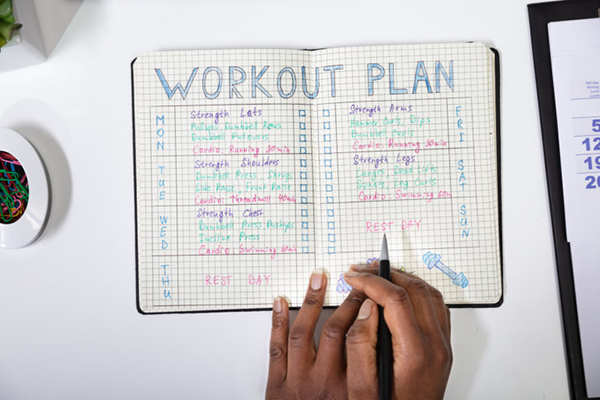Workout Routine Get Derailed? 8 Tips to Get Back on the Wagon

Sticking to a regular exercise routine can be challenging, even in the best of circumstances.
But when life gets busy or if you happen to get injured, it’s all too easy to fall out of the habit.
One week off turns into two, and before you know it your impressive fitness regime — along with all the progress you made — is nothing but a memory.
Though getting back in shape may seem intimidating, if not downright impossible, the truth is that it’s never too late to start working out again.
“There is no ‘right’ time to get back into exercise,” says Amanda Dale, ACE-certified trainer, and sports nutritionist. “It doesn’t have to be a new year, a new month, or even a Monday to get started. There is no age limit or expiration date on getting into shape,” she says.
It doesn’t matter how much couch time you’ve logged during your exercise hiatus, you can get back into working out with a few smart changes and the right attitude.
To help you out, here are eight of the best ways to get back in shape.
1. Figure Out Why You Stopped Exercising the First Time

Were you too busy? Bored with your exercise routine? Recovering from an injury or illness?
Understanding why you got off track is crucial to ensuring you don’t fall into the same pattern.
If you want to maintain your fitness going forward, you need to figure out what went wrong last time.
Maybe you need to find a workout buddy to keep you accountable, even if that’s in the form of a virtual workout group, or you might need to change your mindset and find a type of exercise you truly enjoy.
Once you figure out the obstacles you ran into before, you can make changes to set yourself up for success with a new plan of attack.
2. Start Small
When you’re getting back into working out, you can’t just pick up where you left off. You need to build up your strength and stamina again, so it’s best to start small, advises Beachbody Fitness Expert Cody Braun.
For example, if you used to run 25 miles a week at your peak fitness, try running just five to 10 miles a week to start.
Or, if you lifted weights every Monday through Friday, ease back into it with just two to three days at the gym.
Something is better than nothing, and starting small will also help you safely transition back into a full routine.
More overall daily movement goes a long way, too.
In addition to re-introducing regular workouts into your routine, try things like trading your daily Netflix session for a walk, or using the stairs instead of the elevator.
3. Set Simple, Realistic Goals
When you’re starting to work out again, setting short-term, realistic goals is key, Braun says.
Instead of signing up to run your first marathon or vowing to hit the gym six days a week, stick to something simple — say, working out twice a week for 30 minutes.
Then you can build up to more challenging goals as you progress, Braun says.
As you set your goals, think about a timeline and specific action steps, as well as what feels exciting for you to accomplish, Dale says.
“While everyone’s goal will be different, I encourage clients to move away from body-based goals (“I need to lose weight so I can look better in a bikini”) and toward performance-based goals (“I’d like to run 5K without stopping”) to make sure they don’t get wrapped up in the wrong motivation,” she says.
This way, you’ll view fitness as a part of your lifestyle instead of just a quick fix to help you look better before vacation.
4. Focus on Consistency

When you’re rebooting your fitness routine, you need to “build structures that make it impossible to fail,” Dale says.
That might mean signing up for a weekly group workout class, pre-paying for a month of private sessions with a trainer, or creating a detailed training plan to follow.
Braun recommends scheduling your workouts each week and giving them a spot on your calendar.
“If you have to adjust (your schedule) for any reason, you already have a dedicated block of time for yourself.”
Then, if you can’t make your usual morning gym session, you’ll think to switch it to the evening instead of just skipping it altogether.
“No matter what you’re trying to achieve, working toward it on a consistent, no-excuses schedule is the only way to actually get there,” Dale adds.
5. Don’t Compare Your Current Self to Your Fittest Self
Resist the urge to dwell on how fit you were before you took an exercise break.
“Comparisons — to a former version of yourself, other people, or worse, other people’s social media selves — are never helpful as long-term motivators toward real wellness,” Dale says.
It may be tempting to review old workout sheets to see how fast you ran or how much weight you lifted when you were in top form, but this habit can damage your self-esteem and hinder your progress.
“The only numbers that matter are the current ones,” Braun says. “Understand that getting back in shape is a process.”
Track your workouts from where you’re starting now, then see how much you can improve from there.
6. Create an Accountability System
The key to following through with workouts isn’t just self-discipline, motivation, or willpower — accountability also plays a huge role in sticking to your routine.
When you’re just starting to rebuild your fitness, the biggest factor in your success is whether or not you show up.
To keep yourself on track, try joining a local fitness group, planning workouts with a friend, or investing in a personal trainer.
“Finding a community that will hold you accountable to your goals is huge because on those days when you feel burnt out, they can help you keep that fire alive,” Braun says.
7. Celebrate Your Progress

Acknowledging how far you’ve come is a great way to stay on track with your goals and maintain your motivation.
Carve out time every week to reflect on your workouts and celebrate the little victories, like lifting two more pounds or showing up to all four of the Pilates classes you signed up for.
Dale also suggests creating a specific reward system for meeting your goals.
“For example, book yourself a massage when you hit five workouts in one week, or indulge in a weekend away if you hit 20 workouts in a month,” she says.
8. Evaluate Your Routine and Adjust as Needed
Getting back in shape can take considerable time, so it’s a good idea to check in with yourself regularly to see whether or not your routine is working.
Braun recommends tracking your workouts and reviewing them every three to four weeks.
If you notice a plateau, you may need to reassess your exercise routine and make some adjustments.
Before you change your workouts, though, take stock of your other daily habits first. Factors like diet, sleep, recovery time, and stress can all affect your fitness progress.
You want to make sure you’re hydrating often, nourishing yourself well, and getting adequate sleep, Braun says.
If all of that is on point and you’re still seeing a lag in your results, then it’s probably time to tweak your workouts.
The Takeaway
It’s always possible to reclaim your fitness and get back in shape, no matter how long it’s been since last exercised. You just have to be willing to start.
Once you get going again, focus on setting attainable goals, easing back into your routine, practicing consistency, and enjoying the process.
